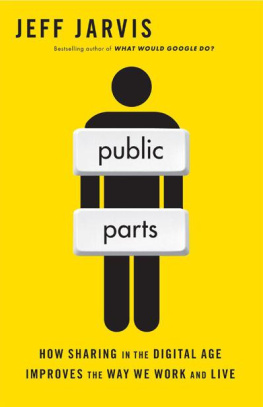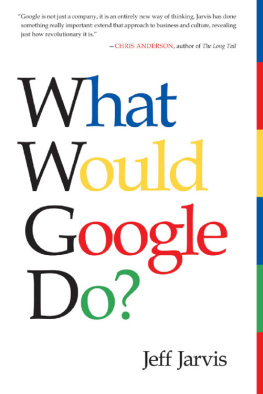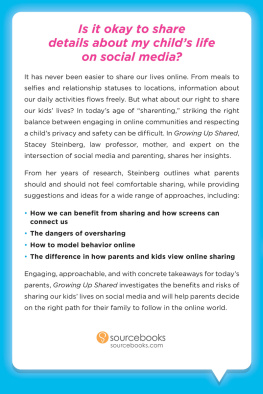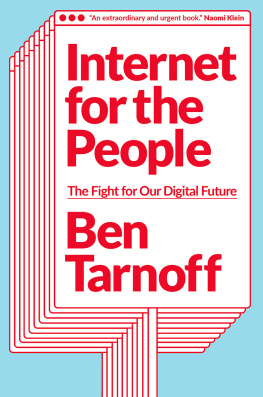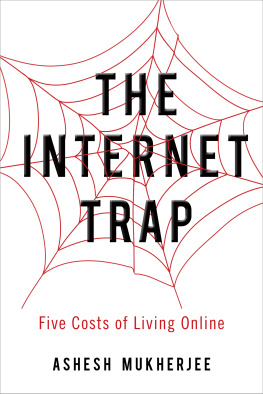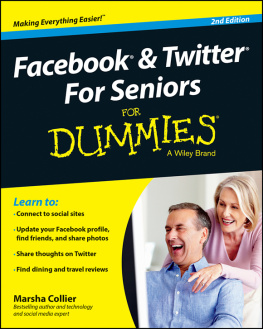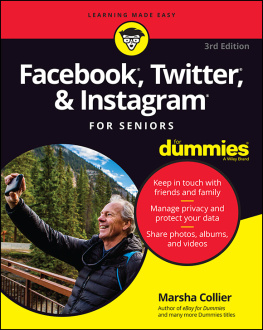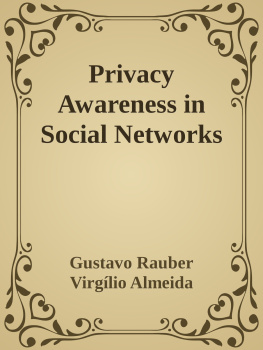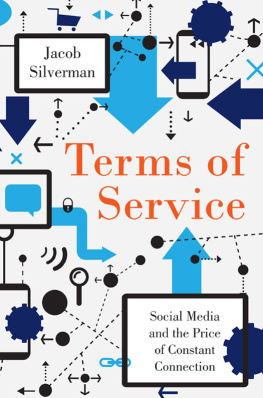

Thank you for purchasing this Simon & Schuster eBook.
Sign up for our newsletter and receive special offers, access to bonus content, and info on the latest new releases and other great eBooks from Simon & Schuster.
or visit us online to sign up at
eBookNews.SimonandSchuster.com

Also by Jeff Jarvis
What Would Google Do?


| Simon & Schuster
1230 Avenue of the Americas
New York, NY 10020
www.SimonandSchuster.com |
Copyright 2011 by Jeff Jarvis
All rights reserved, including the right to reproduce this book or portions thereof in any form whatsoever. For information address Simon & Schuster Subsidiary Rights Department, 1230 Avenue of the Americas, New York, NY 10020.
First Simon & Schuster hardcover edition September 2011
Simon & Schuster and colophon are registered trademarks of Simon & Schuster, Inc.
The Simon & Schuster Speakers Bureau can bring authors to your live event.
Manufactured in the United States of America
10 9 8 7 6 5 4 3 2 1
Library of Congress Cataloging-in-Publication data is available.
ISBN 978-1-4516-3600-0
ISBN 978-1-4516-3637-6 (ebook)
For my wife, Tammy, my children, Jake and Julia, my parents, Joan and Darrell, and my sister, Cindy
and for Howard Stern, who inspires the title and the public life
Contents
Facebook, my son, Jake, told me, was my favorite part of high school. I dont think I had a favorite part of high school. Jakes Class of 2010 was the first to use Facebook after it expanded past colleges in 2005. It extended their school life around the clock. In my youth, that would have been a formula for the infinite loop of hell. My adolescent years were dominated by hormonal high drama, a desert of irony, and social awkwardness I dare not recall or I will cringe into a small ballall alleviated by some good friends and a few great teachers. But for Jake, Facebook allowed him to build and maintain relationships with more friends more of the time. For the Facebook Class of 2010, school became a more social experience, a good experience. As far as Im concerned, thats a miracle.
Facebooks founder, Mark Zuckerberg, is Jakes role modelhis hero, even. Jake is in college, studying computer science and entrepreneurship. While still in high school, he used his skills to write Facebook apps, turning one of them into a business he sold. Zuckerberg left college to combine those disciplines and create one of the two great corporations setting the course for our next age. I wrote about the other company in my last book, What Would Google Do? Just as Google built an industry around search, Facebook is at the core of its own new industry, built on sharing. It is enabling and exploiting our explosive desire to connect with one another. And it is causing us to askas individuals and as societieswhat should be private and what should be public and why. This book is not a sequel to the last; it is not What Would Facebook Do? It is a study of our emerging age of publicness. Here, I will examine the profound change that is overtaking us, presenting us with questions, fearsand opportunities. I will focus on the opportunities.
If my teen years were socially stunted, Im making up for it in middle age. I have Jake to thank for much of that. He is the webmaster of my blog and my secret weapon in understanding the social age. He schooled me in the norms and values of Facebook society. Hes the one who made me pay attention to Twitter, which has made writing this book at once hardercausing constant distraction with the siren call of the conversation that never endsbut also easier, as I always have researchers and editors at the ready. At this moment, Im at my laptop, trying to catalogue the benefits of publicness. As a reflex, I turn to Twitter and ask people there what new and valued relationships theyve made because they are open and public. In moments, answers flow. @john_blanton says he found his wife via chat. Lesbian comic and speaker @heathr says, coming out brought me integrity, less fear, and more energy. An old friend, @terryheaton, says, It helps avoid a lot of losers when dating. @flmparatta found a job. @ginatrapani created a career. @everywheretrip says he has met people all over the world because I let people know where I am on Twitter, Facebook, and blog. @akstanwyck says that on her last trip to nyc I made a point of meeting in person 3 folks with whom Id bonded on twitter. In multiple tweets, @alexis_rueal says that she found most of my friends from high school, some from college and discovered that people I might not have liked 15 years ago have become wonderful friends & I cherish them all now. @sivavaidthe author of The Googlization of Everything and a frequent though friendly sparring partner of mine in panels and postsresponds to my question about forming valued relationships, tweeting, how about you and me?
Because I am public, I have made new friends and reconnected with old ones. I have received work and made moneyincluding this book and the last. I have tested ideas, spread those ideas, and gotten credit (and blame). Ill echo @dustbury, who answered my question on Twitter by saying, The best part about being public is that I cant BS anymore: too many are in a position to call me on it. Makes life easier. Ditto @jmheggen: Being public led to my mantra of honesty. I am who I am all the time because, being public, lies have thin shadows. Politicians and corporations could learn from that tweet. @clindhartsen says he used Twitter and publicness to confess what he eats and weighs; that plus self-determination has lost me 65 lbs. Not to be outdone, I have written about my malfunctioning penismore on that later, Im sure youll be glad to knowand received invaluable advice in return from fellow prostate cancer patients. Being public helps me get information and make decisions. I have learned that the more we share, the more we benefit from what others share. I am a public man. My life is this open book.
Privacy advocates say I should be wary. They say I shouldnt open up so much. These privacy advocates swarm in the media every time a new online service entices us to share something about ourselves. They say we should fear the companies and technologies that use the bait of free content and services, improved social lives, personalization, and increased relevance to get us to open up. They fret about governmentand theyre right to, for government has the means to learn much about citizens and the power to use that knowledge against them. Privacy advocates worry for our young people, who they fear are saying too much. Bad things could happen, they warn. But then, bad things always could.
Search Google News for privacy advocates, and in just one day youll find no end of them quoted by media as an often-anonymous tribe of chronic worriers:
Next page
